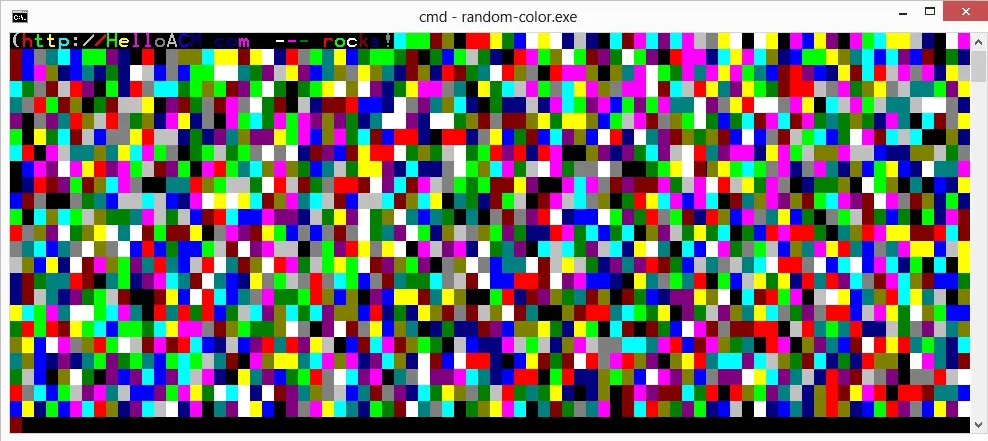In yesterday’s post, the random rectangles are printed using console only without the help of any graphics. The basic type of each element/pixel in the console (code page 437) is defined in the following C/C++ structure:
1 2 3 4 | typedef struct { unsigned char elem; unsigned char color; } SCREENELEMENT; |
typedef struct {
unsigned char elem;
unsigned char color;
} SCREENELEMENT;Therefore, we can easily change the color and character of each pixel, to illustrate the ultimate color showing, we can use extended ASCII 219 to print out a solid square to the console.
1 | const unsigned char BLACK = 219; |
const unsigned char BLACK = 219;
Now, the core statements are just a few lines:
1 2 3 4 5 6 7 8 | for (;;) { for (int i = 0; i < height; i ++) { for (int j = 0; j < width; j ++) { s[i][j].color = rand() % 16; } } printScreen(width, height, s); } |
for (;;) {
for (int i = 0; i < height; i ++) {
for (int j = 0; j < width; j ++) {
s[i][j].color = rand() % 16;
}
}
printScreen(width, height, s);
}It gives the following output, you can use it as a screen saver (to rename the file extension from *.exe to *.scr)

The pre-compiled C++ animation application (g++ compiler/windows) can be downloaded [here ].
The complete C++ source code is:
1 2 3 4 5 6 7 8 9 10 11 12 13 14 15 16 17 18 19 20 21 22 23 24 25 26 27 28 29 30 31 32 33 34 35 36 37 38 39 40 41 42 43 44 45 46 47 48 49 50 51 52 53 54 55 56 57 58 59 60 61 62 63 64 65 66 67 68 69 70 71 72 73 74 75 76 77 78 79 | /* http://HelloACM.com */ #include <iostream> #include <stdio.h> #include <windows.h> #include <unistd.h> // usleep #include <time.h> // for time using namespace std; const unsigned char BLACK = 219; typedef struct { unsigned char elem; unsigned char color; } SCREENELEMENT; BOOL gotoxy(const WORD x, const WORD y) { COORD xy; xy.X = x; xy.Y = y; return SetConsoleCursorPosition(GetStdHandle(STD_OUTPUT_HANDLE), xy); } inline // update the screen void printScreen(int width, int height, SCREENELEMENT **screen) { gotoxy(1, 1); // top-left corner for (int i = 0; i < height; i ++) { for (int j = 0; j < width; j ++) { SCREENELEMENT *cur = &screen[i][j]; SetConsoleTextAttribute(GetStdHandle(STD_OUTPUT_HANDLE), cur->color); printf("%c", cur->elem); // may be faster than cout } } } inline // initialize the screen with pixel se void initScreen(int width, int height, SCREENELEMENT **screen, SCREENELEMENT se) { for (int i = 0; i < height; i ++) { for (int j = 0; j < width; j ++) { screen[i][j] = se; } } } int main() { SetConsoleOutputCP(437); CONSOLE_SCREEN_BUFFER_INFO csbi; int ret; /* get the width of the console */ ret = GetConsoleScreenBufferInfo(GetStdHandle(STD_OUTPUT_HANDLE), &csbi); int width = 80; if (ret) { width = csbi.dwSize.X; } int height = csbi.srWindow.Bottom - csbi.srWindow.Top; SCREENELEMENT **s = new SCREENELEMENT*[height]; for (int i = 0; i < height; i ++) { s[i] = new SCREENELEMENT[width]; } SCREENELEMENT se; se.elem = BLACK; se.color = 0; initScreen(width, height, s, se); srand(time(NULL)); for (;;) { for (int i = 0; i < height; i ++) { for (int j = 0; j < width; j ++) { s[i][j].color = rand() % 16; } } printScreen(width, height, s); } /* clean up */ for (int i = 0; i < height; i ++) { delete[] s[i]; } delete[] s; return 0; /* use Ctrl+C, never returns */ } |
/* http://HelloACM.com */
#include <iostream>
#include <stdio.h>
#include <windows.h>
#include <unistd.h> // usleep
#include <time.h> // for time
using namespace std;
const unsigned char BLACK = 219;
typedef struct {
unsigned char elem;
unsigned char color;
} SCREENELEMENT;
BOOL gotoxy(const WORD x, const WORD y) {
COORD xy;
xy.X = x;
xy.Y = y;
return SetConsoleCursorPosition(GetStdHandle(STD_OUTPUT_HANDLE), xy);
}
inline // update the screen
void printScreen(int width, int height, SCREENELEMENT **screen) {
gotoxy(1, 1); // top-left corner
for (int i = 0; i < height; i ++) {
for (int j = 0; j < width; j ++) {
SCREENELEMENT *cur = &screen[i][j];
SetConsoleTextAttribute(GetStdHandle(STD_OUTPUT_HANDLE), cur->color);
printf("%c", cur->elem); // may be faster than cout
}
}
}
inline // initialize the screen with pixel se
void initScreen(int width, int height, SCREENELEMENT **screen, SCREENELEMENT se) {
for (int i = 0; i < height; i ++) {
for (int j = 0; j < width; j ++) {
screen[i][j] = se;
}
}
}
int main() {
SetConsoleOutputCP(437);
CONSOLE_SCREEN_BUFFER_INFO csbi;
int ret;
/* get the width of the console */
ret = GetConsoleScreenBufferInfo(GetStdHandle(STD_OUTPUT_HANDLE), &csbi);
int width = 80;
if (ret) {
width = csbi.dwSize.X;
}
int height = csbi.srWindow.Bottom - csbi.srWindow.Top;
SCREENELEMENT **s = new SCREENELEMENT*[height];
for (int i = 0; i < height; i ++) {
s[i] = new SCREENELEMENT[width];
}
SCREENELEMENT se;
se.elem = BLACK;
se.color = 0;
initScreen(width, height, s, se);
srand(time(NULL));
for (;;) {
for (int i = 0; i < height; i ++) {
for (int j = 0; j < width; j ++) {
s[i][j].color = rand() % 16;
}
}
printScreen(width, height, s);
}
/* clean up */
for (int i = 0; i < height; i ++) {
delete[] s[i];
}
delete[] s;
return 0; /* use Ctrl+C, never returns */
}–EOF (The Ultimate Computing & Technology Blog) —
GD Star Rating
loading...
595 wordsloading...
Last Post: Simple C++ Animation on Console Windows - Random Squares on CodePage 437
Next Post: Modern getch() implementation on Windows C/C++